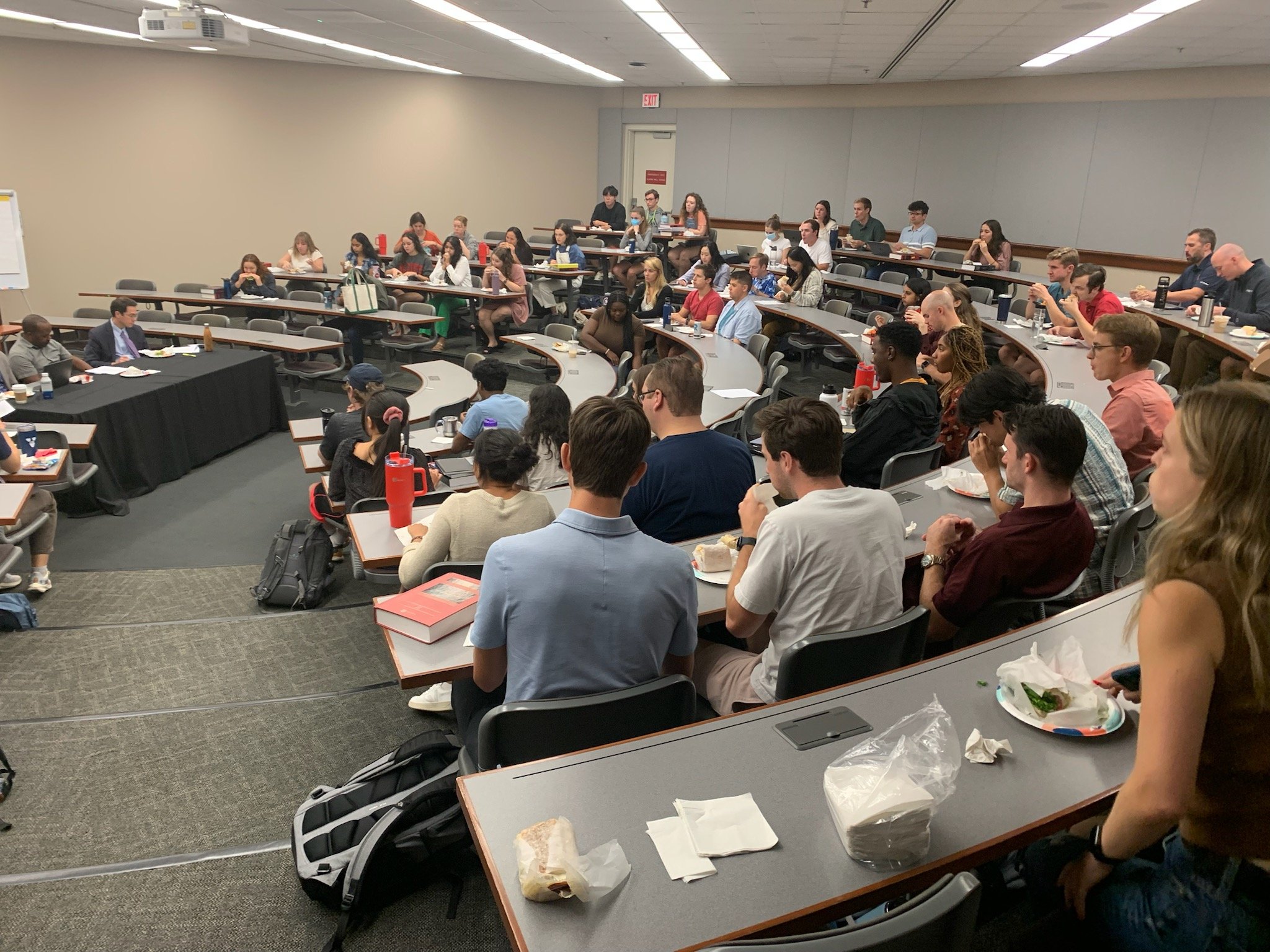Lambda and ACS Host SCOTUS Panel Discussion
Photo Credit: Mason Davenport '25
Caitlin Flanagan '24
Staff Editor
On Wednesday, September 5, Lambda Law Alliance and the American Constitution Society (ACS) kicked off the new school year with their co-sponsored “Supreme Court Roundup,” a lunch-time recap of several pivotal Supreme Court decisions handed down over the summer. The panelists were Professors Bertrall Ross, Craig Konnoth, and Cale Jaffe ’01.
Professor Ross, an expert in election law and the democratic responsiveness of political processes, described the Court’s holdings in both Moore v. Harper[1] and Allen v. Milligan.[2] Although these decisions have been heralded as victories for voting rights, Professor Ross cautioned against overstating the promising implications of both. On Moore, although the Supreme Court did endorse the justiciability of partisan gerrymandering claims, Professor Ross questioned whether the decision may have come down differently if the Court had been reviewing a state supreme court which had, in fact, struck down the legislature's maps for racial gerrymandering (as North Carolina’s Supreme Court did before the April 2023 reversal).
Professor Ross likewise doubted the likelihood of the Court’s continued willingness to apply Section 2 of the Voting Rights Act, despite its application to Alabama’s redistricting plan in Allen. Although the constitutionality of Section 2 was not expressly at issue in the case, Professor Ross focused on Justice Kavanaugh’s concurrence, which expressed curiosity as to whether Section 2 might in fact be susceptible to an Equal Protection challenge. Professor Ross likewise quoted Justice Thomas’ dissent, where the Justice notes the “uncommon clarity” with which the majority’s conclusion “lay[s] bare the gulf between our color-blind Constitution, and the consciously segregated districting system currently being constructed in the name of the Voting Rights Act” (internal quotes omitted).[3] Because Students for Fair Admissions, handed down just weeks after Allen, credited a color-blind theory of the Constitution, Professor Ross suggested that the current Court may, upon reconsideration, strike down the Voting Rights Act for violating the Fourteenth Amendment.[4]
303 Creative v. Elenis was covered by Professor Konnoth, who was personally involved in the underlying litigation and writes on LGBTQ+ civil rights law.[5] He emphasized that though Smith had not yet designed any wedding websites, the Supreme Court still granted the case certiorari and concluded that it would be unconstitutional under the free speech clause of the First Amendment for Colorado to hypothetically compel wedding website designers to create websites for same-sex weddings. Professor Konnoth explained that 303 Creative is the latest in a line of Supreme Court cases which have considered LGBTQ+ civil rights. Yet, while Hurley v. Irish-American Gay, Lesbian and Bisexual Group of Boston (1995) and Boy Scouts of America v. Dale (2000) found that First Amendment expressive freedoms trump anti-discrimination law in the context of private associations, the two more recent decisions, Masterpiece Cakeshop and 303 Creative, seem to address public accommodations.[6]
Professor Konnoth posited that the Court’s application of its expansive definition of constitutionally protected speech has cast neutrality “out the window,” with reference to Rumsfeld v. Forum for Academic and Institutional Rights (2006). The Roberts Court in Rumsfeld held that colleges and universities could be compelled to allow military recruiters to access students in order to receive federal funding, even where such institutions were opposed on “free speech” grounds to endorsing the military’s official “don’t ask, don’t tell” policy of barring open members of the LGBTQ+ community from service.[7] Professor Konnoth finally cautioned that the 303 Creative outcome is an exemplary instance of the importance of coordination amongst co-litigants, as the Colorado Attorney-General’s Office and the American Civil Liberties Union did not mutually agree to some factual stipulations that were ultimately “fatal” to Colorado’s position.
Finally, Professor Jaffe, who researches environmental law, discussed Sackett v. EPA, with which he too was personally involved.[8] Professor Jaffe described the Court’s conclusion in Sackett as a “massive retrenchment” of the impact of the Clean Water Act, which will now only apply to wetlands which have a “continuous surface connection” to other waters of the United States. He emphasized the Court’s “remarkable” willingness to “toss” decades of regulations determining the scope of the Clean Water Act. Even the Court’s willingness to consider Sackett surprised Professor Jaffe. As many commented in response to West Virginia v. EPA (2022), Sackett seemed like it should have been an “easy case” under the extant regulations as they have been interpreted.[9] The two cases, he said, signal a turn in the Court’s attitude towards federal environmental and administrative law. Sackett is a defining case in its particular environmental law context, he said, but perhaps even more notable as an example of Justice Thomas’ and Justice Gorsuch’s broader mission to contract federal regulatory authority.
---
cf3tf@virginia.edu
[2] 599 US _ (2023).
[3] Id., (Thomas, J., dissenting).
[4] Students for Fair Admissions v. President and Fellows of Harvard College, 600 US _ (2023).
[6] Hurley v. Irish-American Gay, Lesbian and Bisexual Group of Boston, 515 US 557 (1995); Boy Scouts of America v. Dale, 530 US 640 (2000); Masterpiece Cakeshop v. Colorado C.R. Comm’n, 584 US _ (2018).
[7] 547 US 47 (2006).
[8] 598 US _ (2023).
[9] 597 US _ (2022).

